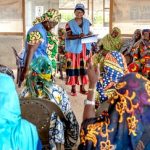 PACMEF
PACMEF
A product of action research under the joint WSSCC & UN Women program, highlighting key insights and findings.

The latest research conducted in Senegal, Niger, and Cameroon provides essential data on menstrual hygiene management. The study was carried out as part of the joint initiative by WSSCC and UN Women, aiming to improve awareness, policy, and access to hygiene facilities for women and girls in these regions.
The findings highlight the challenges, progress, and recommendations for stakeholders involved in improving menstrual hygiene practices and access. PACMEF is committed to sharing these insights to foster informed programs and interventions in West and Central Africa.
For further details, visit the PACMEF Programs page or contact us directly for inquiries.